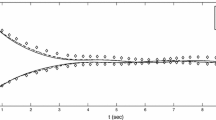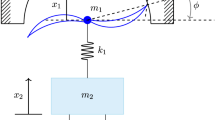Abstract
This paper considers the optimal control of polytopic, discrete-time linear parameter varying (LPV) systems with a guaranteed ℓ2 to ℓ∞ gain. Additionally, to guarantee robust stability of the closed-loop system under parameter variations, H ∞ performance criterion is also considered as well. Controllers with a guaranteed ℓ2 to ℓ∞ gain and a guaranteed H ∞ performance (ℓ2 to ℓ2 gain) are a special family of mixed H 2=H ∞ controllers. Normally, H2 controllers are obtained by considering a quadratic cost function that balances the output performance with the control input needed to achieve that performance. However, to obtain an optimal controller with a guaranteed ℓ2 to ℓ∞ gain (closely related to the physical performance constraint), the cost function used in the H2 control synthesis minimizes the control input subject to maximal singular-value performance constraints on the output. This problem can be efficiently solved by a convex optimization with linear matrix inequality (LMI) constraints. The main contribution of this paper is the characterization of the control synthesis LMIs used to obtain an LPV controller with a guaranteed ℓ2 to ℓ∞ gain and >H ∞ performance. A numerical example is presented to demonstrate the effectiveness of the convex optimization.
Similar content being viewed by others
References
D. S. Bernstein and W. M. Haddad, “LQG Control with an H ∞ performance bound: a riccati equation approach,” IEEE Transactions on Automatic Control, vol. 34, no. 3, pp. 293–305, 1989. [click]
M. A. Rotea and P. P. Khargonekar, “H 2-optimal control with an H ∞-constraint: the state feedback case,” Automatica, vol. 27, no. 2, pp. 307–316, 1991. [click]
P. P. Khargonekar and M. A. Rotea, “Mixed H 2=H ∞ control: a convex optimization approach,” IEEE Transactions on Automatic Control, vol. 36, no. 7, pp. 824–837, 1991. [click]
I. Kaminer, P. P. Khargonekar, and M. A. Rotea, “Mixed H 2=H ∞ control for discrete-time systems via convex optimization,” Automatica, vol. 29, no. 1, pp. 57–70, 1993. [click]
M. Chilali and P. Gahinet, “H ∞ design with pole placement constraints: an LMI approach,” IEEE Transactions on Automatic Control, vol. 41, no. 3, pp. 358–367, 1996. [click]
C. Scherer, P. Gahinet, and M. Chilali, “Multiobjective output-feedback control via LMI optimization,” IEEE Transactions on Automatic Control, vol. 42, no. 7, pp. 896–911, 1997. [click]
I. Masubuchi, A. Ohara, and N. Suda, “LMI-based controller synthesis: a unified formulation and solution,” International Journal of Robust and Nonlinear Control, vol. 8, no. 8, pp. 669–686, 1998. [click]
M. C. De Oliveira, J. C. Geromel, and J. Bernussou, “Extended H 2 and H ∞ norm characterizations and controller parametrizations for discrete-time systems,” International Journal of Control, vol. 75, no. 9, pp. 666–679, 2002. [click]
J. Caigny, J. Camino, R. Oliveira, P. Peres, and J. Swevers, “Gain scheduled H 2 and H ∞ control of discrete-time polytopic time-varying systems,” IET Control Theory and Applications, vol. 4, pp. 362–380, 2010. [click]
M. de Oliveira, J. Bernussou, and J. Geromel, “A new discrete-time robust stability condition,” Systems & Control Letters, vol. 37, no. 4, pp. 261–265, 1999. [click]
J. Caigny, J. Camino, R. Oliveira, P. Peres, and J. Swevers, “Gain scheduled H 2-control of discrete-time polytopic time-varying systems,” in Congresso Brasileiro de Automatica, 2008. [click]
J. Caigny, J. Camino, R. Oliveira, P. Peres, and J. Swevers, “Gain scheduled H ∞-control of discrete-time polytopic time-varying systems,” Proceedings of 47th IEEE Conference on Decision and Control, pp. 3872–3877, 2008. [click]
A. White, G. Zhu, and J. Choi, “Hardware-in-the-loop simulation of robust gain-scheduling control of port-fuelinjection processes,” IEEE Transactions on Control Systems Technology, vol. 19, no. 6, pp. 1433–1443, 2011. [click]
A. White, J. Choi, R. Nagamune, and G. Zhu, “Gainscheduling control of port-fuel-injection processes,” Control Engineering Practice, vol. 19, no. 4, pp. 380–394, 2011. [click]
A. White, Z. Ren, G. Zhu, and J. Choi, “Mixed H 2=H ∞ observer-based lpv control of a hydraulic engine cam phasing actuator,” IEEE Transactions on Control Systems Technology, vol. 21, no. 1, pp. 229–238, Jan 2013. [click]
A. P. White, G. Zhu, and J. Choi, Linear Parametervarying Control for Engineering Applications, Springer, 2013. [click]
K. Zhou and J. C. Doyle, Essentials of Robust Control. Prentice Hall, Upper Saddle River, New Jersey, 1998.
G. Zhu, M. Rotea, and R. E. Skelton, “A convergent algorithm for the output covariance constraint control problem,” SIAM Journal on Control and Optimization, vol. 35, pp. 341–361, 1997. [click]
J. Huang, Y. Shi, H. Huang, and Z. Li, “l2-l∞ filtering for multirate nonlinear sampled-data systems using TS fuzzy models,” Digital Signal Processing, vol. 23, no. 1, pp. 418–426, 2013. [click]
Z. Chen and Q. Huang, “Exponential l2-l∞ filtering for a class of stochastic system with markovian jump parameters and mixed mode-dependent time-delays,” International Journal of Control, Automation and Systems, vol. 12, no. 3, pp. 552–563, 2014. [click]
G. Zhu, K. M. Grigoriadis, and R. E. Skelton, “Covariance control design for hubble space telescope,” Journal of Guidance, Control, and Dynamics, vol. 18, no. 2, pp. 230–236, 1995. [click]
K. Tan, K. M. Grigoriadis, and F. Wu, “Output-feedback control of LPV sampled-data systems,” International Journal of Control, vol. 75, no. 4, pp. 252–264, 2002. [click]
J. Caigny, J. Camino, R. Oliveira, P. Peres, and J. Swevers, “Gain-scheduled dynamic output feedback control for discrete-time LPV systems,” International Journal of Robust and Nonlinear Control, vol. 22, pp. 535–558, 2012. [click]
M. De Oliveira, J. Geromel, and J. Bernussou, “An LMI optimization approach to multiobjective controller design for discrete-time systems,” Proc. of the 38th IEEE Conference on Decision and Control, vol. 4, pp. 3611–3616, 1999. [click]
P. Apkarian, P. C. Pellanda, and H. D. Tuan, “Mixed H 2=H ∞ multi-channel linear parameter-varying control in discrete time,” Systems & Control Letters, vol. 41, no. 5, pp. 333–346, 2000. [click]
J. Löfberg, “Yalmip: A toolbox for modeling and optimization in MATLAB,” Proceedings of the CACSD Conference, Taipei, Taiwan, 2004. [Online]. Available: http://usersisyliuse/johanl/yalmip [click]
J. Sturm, “Using SeDuMi 1.02, a MATLAB toolbox for optimization over symmetric cones,” Optimization methods and software, vol. 11, no. 1, pp. 625–653, 1999. [click]
P. Gahinet, A. Nemirovski, A. Laub, and M. Chilali, Matlab LMI Control Toolbox, The MathWorks Inc, 1995.
Author information
Authors and Affiliations
Corresponding author
Additional information
Recommended by Associate Editor Izumi Masubuchi under the direction of Editor Yoshito Ohta.
Andrew White received his Ph.D., M.S. and B.S. degrees in Mechanical Engineering from Michigan State University, in 2012, 2008 and 2006, respectively. Currently, he is working in the powertrain virtual analysis department at Chrysler. His research interests include adaptive and robust control, and parameter estimation, with applications to engine control, robotics, and nondestructive testing and evaluation. He is a member of IEEE and ASME.
Guoming Zhu is a professor of mechanical engineering and electrical/computer engineering at Michigan State University. Prior to joining the ME and ECE departments, he was a technical fellow in advanced powertrain systems at the Visteon Corporation. He also worked for Cummins Engine Co. as a technical advisor. Dr. Zhu earned his PhD (1992) in aerospace engineering at Purdue University. His BS and MS degrees (1982 and 1984 respectively) were from Beijing University of Aeronautics and Astronautics in China. His current research interests include closed-loop combustion control, adaptive control, closed-loop system identification, LPV control of automotive systems, hybrid powertrain control and optimization, and thermoelectric generator management system. Dr. Zhu has over 30 years of experience related to control theory and applications. He has authored or co-authored more than 140 refereed technical papers and received 40 US patents. He was an associate editor for ASME Journal of Dynamic Systems, Measurement and Control and a member of editorial board of International Journal of Powertrain. Dr. Zhu is a Fellow of SAE and ASME.
Jongeun Choi received his Ph.D. and M.S. degrees in Mechanical Engineering from the University of California at Berkeley, in 2006 and 2002, respectively. He also received a B.S. degree in Mechanical Design and Production Engineering from Yonsei University at Seoul, Republic of Korea in 1998. He is currently an Associate Professor with the Departments of Mechanical Engineering and Electrical and Computer Engineering at the Michigan State University. His current research interests include systems and control, LPV and robust control, system identification, and Bayesian methods, with applications to mobile robotic sensors, environmental adaptive sampling, engine control, human motor control systems, and biomedical problems. He is an Associate Editor for the Journal of Dynamic Systems, Measurement and Control (JDSMC) and a Co-Editor for a Special Issue on Stochastic Models, Control, and Algorithms in Robotics in JDSMC. His papers were finalists for the Best Student Paper Award at the 24th American Control Conference (ACC) 2005 and the Dynamic System and Control Conference (DSCC) 2011 and 2012. He was a recipient of an NSF CAREER Award in 2009. Dr. Choi is a member of ASME and IEEE.
Rights and permissions
About this article
Cite this article
White, A., Zhu, G. & Choi, J. Optimal LPV control with hard constraints. Int. J. Control Autom. Syst. 14, 148–162 (2016). https://doi.org/10.1007/s12555-014-0248-4
Received:
Revised:
Accepted:
Published:
Issue Date:
DOI: https://doi.org/10.1007/s12555-014-0248-4




